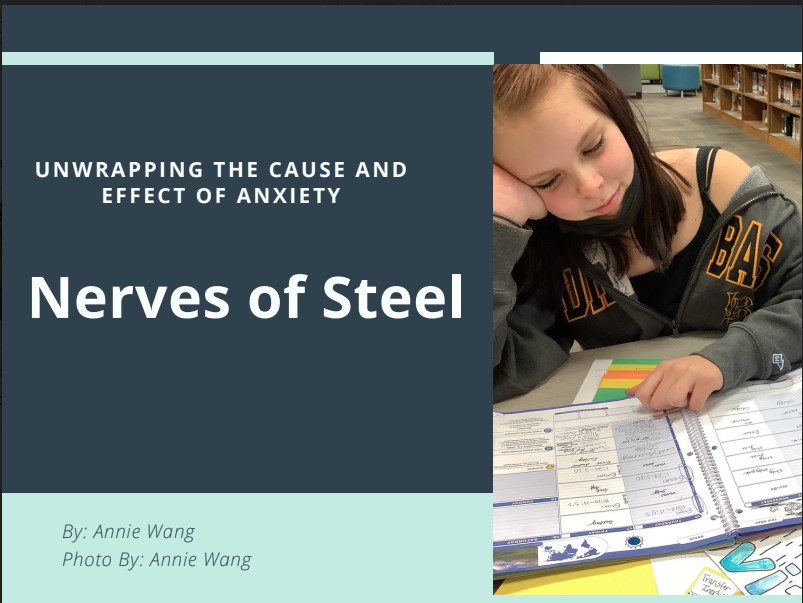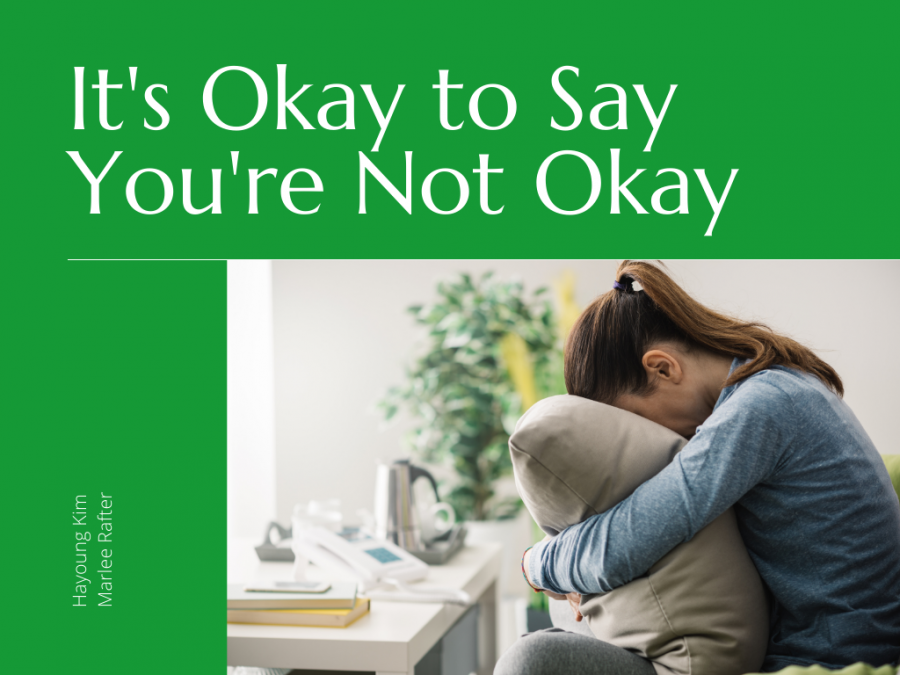It’s Okay to Say You’re Not Okay
May 20, 2021
Mental health issues have always been an ongoing problem for teenagers because they do not tell people how they feel at school and home. The standard society has set for teens is that everything should be picture-perfect. Moreover, people expect them to respond with the usual, “I’m fine, how are you?” They don’t bother to think that teens may be masking their genuine emotions and feelings.
“Teen depression may be linked to learning to feel helpless — rather than learning to feel capable of finding solutions for life’s challenges,” Mayoclinic states. Often, the world does not accept others for their differences. Some teenagers feel they have to mask their problems and authentic self to be approved or fit into the category of society’s so-called “normal” teenager. Many teens can encounter a time when they feel lost and anxious in their thoughts. Negative beliefs about themselves can keep piling on and on and can eventually lead to giving up. Teens frequently feel like no one supports them and guides them around all of life’s challenges. Others feel like they are a burden to the ones they love. Many believe that life would be better if they are gone.
“… It’s often very hard to judge who is suffering from a mental illness or how it affects them,” author Hannah Allaway states in her article Here’s Why Mental Illness Jokes Aren’t Funny, “So, you never know what effect your words might have on someone.” Many teens and students are too afraid to admit to their family and peers about their ongoing battle with their mentally unstable self. There are countless cases when teenagers are fighting and struggling in silence, just because they are afraid of the reaction from their peers. Because it is difficult to know whether a person is dealing with a mental issue, jokes about physiological health, such as depression and OCD, can offend others deeply. Insensitive comments such as, “Oh, I’m so depressed because my parents didn’t let me go to the sleepover” can scar those dealing with mental issues. Seeing everyone joke about their problems can be hurtful, but they laugh along with the joke. Teens are less likely to confront others when they feel as though they are the punchline.
According to mentalhealth.org, “Talking about your feelings can help you stay in good mental health and deal with times when you feel troubled.” Although it may not seem like it, when teens talk to someone about their problems and feelings, like a counselor, friend, or parents, it can help relieve stress and make them feel better. It is not a sign of weakness. It is part of taking charge of their well-being and doing what they can to stay physically healthy. No matter how they might feel, good or bad, it’s healthy to put their feelings into words.
The saying goes, “Suicide is a permanent solution to a temporary problem.” Call 1-800-273-8255 for help; this is the national suicide hotline. If you don’t feel okay, or you are going to attempt something terrible, remember; you matter.
















Eric • Apr 27, 2022 at 11:41 am
It’s good that we talk about this topic! You have no idea what other people are feeling or thinking so teaching people about the importance of mental health is necessary.This is a great paper on mental health and suicide prevention. I like how you used facts to make a statement.
Raghav Ratkalkar • Apr 26, 2022 at 11:52 am
This is a very important topic that needs to be addressed. Depression is at an all-time high, and there are many factors that lead to the rising cases of teen depression among young students. We need to make sure that teens know that it’s completely fine to not be fine. We find ourselves striving to push ourselves to meet others’ standards rather than be content with ourselves and what makes us happy. I really liked the line, “Suicide is a temporary solution to a permanent problem.” When you take your life away, you can’t take the action back. What can help is talking to a trusted adult, a counselor, or making friends that will lift you up instead of pushing you down. We must never judge people struggling with mental health and instead ask them: Hey, are you okay? They may say yes, but you never know what’s actually going on inside their head.
Howard chen • May 26, 2021 at 12:17 pm
I think that this is a great informative article, but maybe make some of the sentaces flow more smoothly in some of the paragraphs like 3 and 4.
Kassey Dzenis • May 26, 2021 at 12:14 pm
It’s good that we talk about this topic! You have no idea what other people are feeling or thinking so teaching people about the importance of mental health is necessary. Thank you for informing us!
Seonae Kim • May 21, 2021 at 12:19 pm
Everyone is not ok even though they say they are okay so they should always be not afraid to tell at least one person that their not okay.. Its always okay to say you are not okay because they will help you rather than not helping you … I hope everyone has a comfortable person or friend to talk to about your or our personal health.
Erblina Topalli • May 21, 2021 at 12:10 pm
It’s best to speak to an adult or to a close friend that comforts you. Talking about your mental health makes you feel better and it lets you relive your stress that you have kept in. You may be laughing in the outside but in the inside you are broken and that’s mental health that needs to be fixed. Finding better friends can increase your health and your mood.
Yidan Liu • May 21, 2021 at 12:09 pm
If you feel not right or feeling sad or angry. Consider talking to your friends or an adult you trust about the problems you have. That can decrease the amount of stress you have. If you ever get insulted because you have a mental illness, go tell someone you know and trust. If you ever see someone making fun of someone with a mental illness, please tell them to stop or tell an adult. It is okay to have a mental illness. You are not weird or unusual because of it. We can fight it together!
Richard Pang • May 21, 2021 at 12:09 pm
I feel like it captured the image many teenagers get fairly well and accurately, where they are in a hostile environment and can’t afford to show weakness.
Aran Anuraj • May 21, 2021 at 12:09 pm
Aran Anuraj
Thank you for writing this article that could really help a lot of people having any of these thoughts or problems.
Gus Preble • May 21, 2021 at 12:09 pm
This is a great paper on mental health and suicide prevention. I like how you used facts to make a statement.
Abigail Williams • May 21, 2021 at 12:08 pm
I think this article is really sweet and a helpful reminder that if you feel like this, your not alone! I so glad that people are taking notice that some people actually have this issue and its hard to overcome problems like this. I am very impressed with the writing and would recommend others to read it as well!
Dori Karafanda • May 21, 2021 at 12:07 pm
I think this article is very important to people dealing with their mental health. It teaches people that just because your okay doesn’t mean everyone else is. This article can explain to people to not make jokes because you never know what people are dealing with.
Driola • May 21, 2021 at 12:07 pm
I can say things in this world are difficult for some people more than others so that is why it is important to check on each other. This article is a good example of how some people struggle in ways many people can’t see, so that’s why it’s important to check up on people even if you don’t really talk to them.
P.S
Great article
sooho choi • May 21, 2021 at 12:07 pm
More of nice articles like this might help people to recognize, understand about some of the teenagers’ mental health issues and their circumstances better.
Zachary Jones • May 21, 2021 at 12:06 pm
Many people nowadays have trouble admitting they’re not ok because they could be afraid that many people think that they’re doing it for attention, or because they don’t want anyone knowing, or they think they’re ok but they’re not. The kids suffering through this don’t realize it but suffering depression or being suicidal is a big deal. Thank you to the people that wrote this article because this tells them that they can talk to the people that they love without judgement, it also shows that everything will be ok in the long run if they do get help.
Trinh Nguyen • May 21, 2021 at 12:06 pm
It’s such a nice thing to see others who are willing to express their feelings and emotions based on their mental health. Many people are struggling and these small acts of kindness make a difference in the world in helping others reach out to get help. Thank you so much for making a good impact on the community and making others feel welcome and safe!
Tessa Adkins • May 21, 2021 at 12:05 pm
This is a very powerful message that can be very hard to write out. This article was very good at describing depression and mental issues. It was good to add statements from other articles to show that this is a very serious problem and shouldn’t be taken lightly. Good job at writing this piece and great job describing everything and showing how depression is very serious.
Quin Morgan • May 21, 2021 at 12:04 pm
I’m glad this article is out there to spread awareness! I hope people with mental health disorders can get help.
Spencer • May 21, 2021 at 12:03 pm
Good Job on the article!
Cooper Guthrie • May 21, 2021 at 12:03 pm
My current problems cannot be helped by anyone reading this, with the exception of the person who typed it.
Laney • May 21, 2021 at 12:02 pm
Good job, it’s a very nice informative article.
Elijah Bowen • May 21, 2021 at 12:01 pm
I believe that is smart to speak your mind cause if you don’t there is no one who can help you but if you do there are tons of people who can help you.